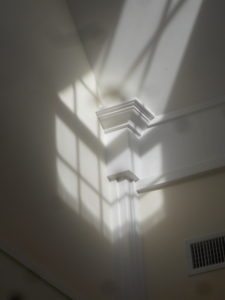In ancient Egypt (so says Joan Grant, in Winged Pharaoh), the priests used this formula in their teaching: “I of my own knowledge tell you that this is the truth.”
Not, “This is what I have been taught,” but, “I of my own knowledge…”
Where, today, would we find equivalent knowledge? Equivalent institutions?
Our universities and churches cannot produce such teachers. They teach what is said to be true, or might be true, or ought to be true, or what we wish were true. But knowledge cannot be transmitted by those who do not know.
Who has first-hand knowledge of the true nature of physical-matter reality? Of the worlds beyond physical life? Of what we as individuals and as groups can achieve?
In this, religion and science both have failed us.
Religion fails us in attempting to teach from faith rather than from personal knowledge. This leads naturally to a demand for faith and obedience as substitutes for study and knowledge.
Science fails us in refusing to investigate certain categories of experience or thought (such as what people call the supernatural, whether labeled as religion or parapsychology) because it believes, before investigation, that these categories of experience are nonsense.
In both cases, this failure is not necessarily the result of hierarchies scheming to obtain and retain power. Just as often, it is the result of people not realizing that first-hand knowledge is there to be obtained.
Obviously, there is no sense in denying that religion and science have worth, that they are at least partly based on truth, that at best they are based on a desire to find truth. But each is more valuable when it grounds its view of the nature of the universe less on inherited beliefs (no matter how widespread) and more on first-hand knowledge.
We are starving for that knowledge. In fact, we often kill others, and may kill ourselves, substituting arbitrary certainty for knowledge that we do not have. Uncertainty – and the fear that uncertainty brings – leads individuals and societies to do desperate things. If you don’t know, you must rely on faith. But faith implies doubt. Doubt – and the resulting repression of doubt – breed fanaticism and intolerance. Worse, they breed ignorance pretending to infallibility, which breeds charlatans and blind followers.
The good news is that first-hand knowledge is available.
From work at The Monroe Institute and elsewhere, I learned how to obtain first-hand knowledge of life beyond what our society considers normal. I learned how to extend my abilities in ways that our society considers to be impossible. My experience shed light on the reality that has been described (and repeatedly misunderstood) in scripture the world over.
I am not an Egyptian priest, and I cannot transfer my first-hand knowledge. But I can tell how you may obtain your own first-hand knowledge, and I can offer my own preliminary report of my own findings.
That’s what this site is all about. Among other things, I will share with you true stories that give a sense of what first-hand experience makes possible, hoping to describe my journey of self-discovery (self-creation?) in such a way as to encourage you on your own journey.
I of my own knowledge tell you what follows.

Dear Mr. DeMarco,
What you say that universities and churches cannot produce such teachers, that teach based on their own knowledge, feels so true. A few years ago, a teaching assistant scolded me for using “collective unconscious” in a proposed thesis saying, “it’s not grounded in an argument that’s logical, and not even real, so don’t use even use it.” If I don’t write papers about what the professor and established field says is “true,” then I get in trouble.
In regards to religion, I never understood how I was supposed to believe in something based on faith, just because a person says it’s true, even if it doesn’t make sense.
A lot of things I experience personally on a daily basis, I can never really share, for fear of being called “crazy,” because those experiences aren’t “normal” since they involve what I perceive as being beyond the physical realm. I see the magical world of Spirit as being more real, although I hesitate to share it. But your site gives me encouragement on my journey, so I want to thank you. Your blogs at Hampton Roads and your website are a Light in my life, and inspire me.
Sincerely,
Naomi
Hello, Mr. DeMarco. I have read your articles in The Echo World over a long period of time. I have been positively impressed with your presentations. I currently advertise in The Echo World for the offerings at The Wild Blue Heron Center. http://www.wildblueheroncenter.com.
I have wanted to meet you for some time. I am writing at this point because of your visit to Egypt. I went to Egypt with my friend Jean Houston in 2010. She facilitated a powerful ceremony in the King’s chamber both within and surrounding the sarcophagus. I would like to compare experiences. My email-victoriamr7@gmail.com I hope to hear from you when possible. Best to you, Victoria